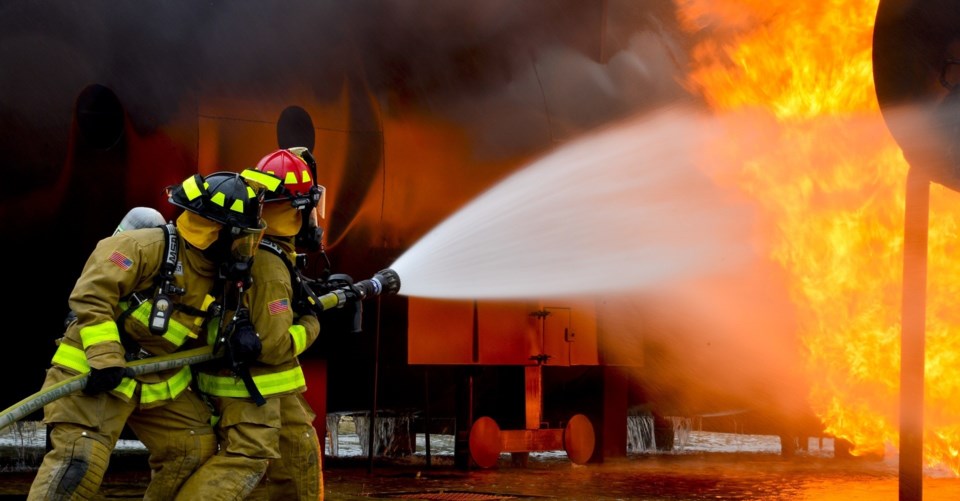WELLINGTON COUNTY – The closing of the Ontario Fire College (OFC) has left Wellington County fire chiefs concerned, uncertain, but not entirely pessimistic about how it will impact smaller departments.
In January, the province announced the firefighter training hub in Gravenhurst will close on March 31, 2021, and will enhance opportunities at 20 regional training centres.
In a statement, OPSEU president Warren Thomas called the announcement a major blow to small and rural communities.
"Most communities are already suffering the effects of never-ending COVID-19 lockdowns," said Thomas. "They don't need more costs piled on their plate, they need relief now."
Centre Wellington fire chief Brad Patton said his opinion is this move is a provincial download of costs and agrees with Thomas this will cost small municipalities more money.
He explained the cost of a course at the OFC costs $65 because it is subsidized by the province.
Patton said the courses will cost more at municipally-run regional training centres, he figures somewhere in the $400 range and in some cases up to $1,400.
There's now also meals and accommodations to be paid for which were previously provided at the college.
“I get the argument from the province that ‘well, you’ll be able to drive back and forth to it instead of staying there,'” Patton said.
“There’s a lot of regional training centres where it’s too far to commute. If your class starts at eight o’clock and you’re in a busy congested area, it’s just unreasonable for you to do that commute.”
Patton said larger fire departments can afford to build special training facilities whereas smaller municipalities generally don’t have that option.
“For a small municipality to build a burn facility or fire investigation facility for training...you’re talking millions of dollars,” Patton said, although he mentioned sometimes neighbouring municipalities get invited out to training if there is room.
Jim Petrik, Guelph/Eramosa fire chief, shared much of the same concerns as Patton, calling the OFC an economical way to provide training for firefighters.
“The cost of training is expected to increase significantly, which either means there will be fewer training opportunities or training will become much more expensive for municipalities,” Petrik said via email.
Chris Harrow, fire chief for Minto and Wellington North, said he’s more optimistic and looking at the upsides to expanded regional training centres.
“It’s tough to send people to the college, they have to take a week off work and they have to go up to Gravenhurst Monday through Friday,” Harrow said, acknowledging he’s likely in the minority with his opinion. “That’s a lot to ask of volunteers. Being able to teach the courses locally is a huge benefit for us.”
Harrow said he does see some costs going up, particularly for specialty courses, but hopeful the province may come through for them by identifying certain centres for these courses.
Patton said Centre Wellington Fire Department has been earmarked as a regional training centre which makes sense as they already do courses for departments across the county.
For the basic courses, he said he can see the regional centres working well ,but this falls apart when you get to specialty courses, like higher level officer courses, which may only have one or two people in a department needing to take it.
“You won’t get the demand to host one of those courses in say Centre Wellington or one of the other regional training schools because there’s just not enough people, but provincially there is,” Patton said.
“That’s why a central college is perfect for that. You need special props, you need special instructors, they’re very complex courses.”
Harrow said he’s left wondering if the province would continue to subsidize training at the regional centres as there has been no announcement on that yet.
“That’s the part that nobody knows, everybody’s waiting to see what will happen with that,” Harrow said.
Patton also said this has left him with more questions than answers and it's unclear what this system will look like.
“I’ve been going to the fire college since the 80s and when you take the administration courses, they tell you ‘you have to have a business plan, you have to think out your decisions,’” Patton said. “Then of course the province doesn’t do any of that.”
Petrik reflected on the loss of less tangible benefits of the college of being around other firefighters.
“The camaraderie and fellowship that was fostered at the OFC is something that will be missed tremendously,” Petrik said. “I remember some of the fantastic training that I received over the years at the OFC and some of the amazing people that I met. To not have those opportunities in the future is a very sad outcome.”



